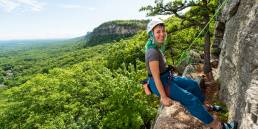Learning to rock climb, whether or not we’re aware of it, forces us to draw on some of our more virtuous characteristics. It takes trust in your belay partner, and a smidge of courage to go for that next move when your forearms start to burn. It also requires a sense of adventure and, at times, the ability to shut out fear. Especially if you’re young, learning to climb and experiencing the outdoors can be a formative experience, instilling a code of ethics that can last a lifetime.
But, unfortunately, rock climbing can also be really expensive and inaccessible to most of the population. Aside from the fact that it requires living near mountains and cliffs, being able to consistently engage in the sport is linked, to a degree, with one’s socioeconomic status. It’s difficult to begin without the necessary money and resources. So, how, then, can the sport be brought to kids who might not otherwise have the opportunity to climb but could benefit physically and emotionally from it?
Since 2000, Kismet Rock Foundation has tried to answer that question. Kismet is a climbing school based in North Conway, N.H., that identifies kids who could benefit from climbing’s confidence-building and problem-solving skills, but who don’t have the means to participate.
More specifically, Kismet looks for impressionable kids, possibly prone to violence, drugs, or depression in the future, who may find themselves going down a negative path if they don’t receive the right guidance. They are often children with a lower socioeconomic status from cities and towns around New England. Kismet identifies these kids by working directly with their schools and families, and then strives to redirect their potentially negative path through technical rock climbing instruction, along with providing a family-like home environment.

“We look for students who are close to giving up.”
Kismet’s screening process is rigorous. To identify those who will get the most out of the program, the organization carefully chooses kids from eight different rural and urban schools. Kids from broken homes, who haven’t yet found their passion, and are beginning to lose hope are often high on the list. They are boys and girls who are just beginning their difficult teen years, and are in need of an activity to help them develop their self-confidence.
“We’re very specific about the students that come to the program,” says Executive Director Chad Laflamme. “First and foremost, they must be kids who have no access to similar programs.” This means Kismet only selects kids who would otherwise be unable to participate because of geography or money. In addition, the students must qualify for free and reduced lunch, which is verified by the parents. “We work directly through the middle schools and with the parents to find these kids,” says Laflamme.
The second step prioritizes students who are particularly at-risk because of their social and economic capital limitations. Low socioeconomic status is recognized as a risk factor for mental illness, so Kismet seeks to select students who could be prone to these issues down the road if they’re not provided with the proper nurturing environment and outlet. In this case, the rock-climbing instruction provides both.
“We look for kids who are on the edge of breaking contract with society,” says Laflamme. “We look for students who are close to giving up. Our students don’t need therapy; they’re not adjudicated,” explains Laflamme, noting that oftentimes, Kismet’s students just need a guiding hand.

“You have to build up that trust and confidence in yourself.”
Once the students have been accepted, they begin Kismet’s program. Gashim Nyapir, a Kismet graduate and now a board member, recalls being a bit nervous on his first day. But, he was ultimately calmed by the welcoming staff and atmosphere. Says Nyapir, “When we first got there, Chad [Laflamme] was the first staff that I met, and right away, he welcomed me into the house with the other students.”
When the program starts, the kids are split into groups. “We have about eight or nine kids in each group,” says Laflamme. That group lives and climbs together for the duration of their time at Kismet—one week every summer for four years. “They get really close.”
The climbing portion entails a meticulously designed, technical education that fosters each child’s emotional development and physical confidence from the beginning. “We start right here in town to really get the basics down,” explains Laflamme. The children are introduced to very easy, fifth-class terrain, so that they can take it slow and get used to trusting the system and their belayers. “A lot of these students are very vulnerable, so we take our time. We don’t want to scare them away from climbing.” Groups are led by two to three certified climbing instructors, each of whom has at least five years of teaching or guiding experience.
Climbing can be a little scary at first, but the kids’ belief in their abilities starts to grow through practice and acquiring new skills each day. “For me, being on the rope was a little untrustworthy at first, because you’re putting your whole body and trust in a rope, cams, and someone else,” explains Nyapir. “You have to build up that trust and confidence in yourself.”
Every student is different, but the goal is to boost their courage and ability to trust—despite whatever difficulties they’ve endured in the past—by slowly expanding their climbing skill set each year. The technicality and difficulty increase as the program progresses.

“I love those guys. I still talk to them to this day.”
When the kids are not out learning to climb, the environment at their temporary home—the Kismet House—is an inclusive, family-like atmosphere. Imagine a healthy family environment with two parents (the staff) and eight children, where everyone helps out with meal preparation and cleanup. The consistency and nurturing atmosphere are essential, because many of the kids come from difficult home environments.
“We have in-house staff,” explains Laflamme, “who really work as surrogate parents to create that safe and inclusive atmosphere.” The children tend to bond quickly with one another because of their shared experience and similar backgrounds. The staff treats the students as welcome members of the Kismet family, making sure they are seen, listened to, and loved. “Many of our students don’t have access to this kind of experience in their homes. A lot of them come from really chaotic conditions,” says Laflamme. “So the [living component] is probably just as important as the climbing component.”

“We have students that say they don’t know if they’d be alive without Kismet.”
After four summers, not to mention making a handful of memories, Kismet’s students solidify their achievements with a graduation ceremony. Saying goodbye to fellow students can be hard, but many graduates remain friends long after the program is finished. “I love those guys. I still talk to them to this day,” says Nyapir. “Because we went through this program and experience together, I feel this responsibility to check up on them.”
The feedback from graduates is almost always positive. “We get a lot of great feedback from all our students,” says Laflamme, attesting to the effectiveness of Kismet’s program. “We have students that say they don’t know if they’d be alive without Kismet. A few have said they would have committed suicide or they’d be in jail without us.”
Nyapir agrees that Kismet was a positive experience, recalling his time in the program. “Kismet has shaped me to become more of an adult. It’s shaped me to become a better role model,” he says. “In physical terms, I have lost a lot of weight from the hiking and walking in general. Kismet came at a perfect time in my life.”
For many kids, Kismet is a transforming experience—even life-changing. “It made things a little easier for me in terms of understanding another human being. It changed my way of approaching people,” says Nyapir.
Many of the students come back as paid interns or house staff, or a select few like Nyapir return as members of the Board of Directors. But, all of them go into the world with a greater sense of self-worth, increased confidence, and more hope than they had when they arrived.
“The growth that happens for the kids, it’s something you have to see for yourself to believe.”
Nyapir says one of his favorite parts of being a board member now is watching the current students’ progress mirror his own. “I [love to] watch the kids progress,” he says. “The growth that happens for the kids, it’s something you have to see for yourself to believe.”
Certainly, Kismet serves as an example, not only of the transformative power rock climbing can have on the lives of these young people, but also of the incredible things that they can achieve when they’re provided with the proper environment to flourish. “The kids become happier throughout their four years,” says Nyapir. “They have confidence in themselves and the world.”

How Can I help?
Kismet is offered to students at no cost, which means they rely on grants, family foundations, individual donations, and business communities to provide programming. Flowfold, as an example, has recently joined the Kismet community as a business sponsor, providing funds to cover scholarship dues for students in their local region.
“The testimonials from the students really moved us at Flowfold,” said Flowfold’s COO James Morin. “Climbing is a fantastic way to get outside and enjoy the beautiful outdoor playground we have all around us. We are beyond proud to support Kismet and cannot wait to climb with the students this summer.”
Kismet students are not in the position to access this education without your help. To make a tax deductible donation now, use their online donation form.

Lucas Kelly
Luke Kelly is a writer and landscape photographer from Red Hook, NY. He says he’s a traveler first, having spent four summers working as a fisherman in Alaska to fund his adventures across the globe. His main goal is to inspire people to get outside, be active, and to explore new places. When he’s not out taking pictures, Luke can usually be found on his paddleboard, road bike, or skis depending on the season. You can follow his trips on Instagram @lukekellytravels.
Related Posts
April 24, 2024
What to Bring When Road Tripping with Your Dog
Prepare for the ultimate road trip with…




